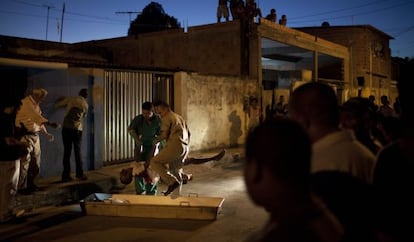Striking police in Brazil set off murderous nationwide crime spree
Law enforcers agree to give the protest a break until after Carnival

Police in Brazil on Tuesday temporarily called off, until after Carnival, a nationwide strike that had unleashed a serious crime wave claiming more than 180 lives and raising the government's concerns about security ahead of the 2014 soccer World Cup.
For two weeks, police forces in different states began walking off their jobs as part of their demands for higher wages. In the state of Bahia, where the strike began on January 31, the demonstrations led to rampant looting, assaults, vandalism and murders, which doubled Bahia's homicide rate. Police in Rio said they decided to end the strike to guarantee safety during the world-famous Carnival celebrations, which officially get underway on Friday and will last until next Tuesday. Brazilian police officers are considered among the worst paid in the world and have a very high fatality rate.
At the center of the conflict is a bill before Congress that proposes a uniform salary structure for all officers in the different states. President Dilma Rousseff has predicted that if the law is passed, many states in the Brazilian federation could go bankrupt trying to pay officers' salaries. At the same time, she said that the same-pay proposal would be unfair to officers who live in states with higher costs of living.
With 27 states, Brazil is as almost as diverse as a continent, with noticeable differences in economy and living standards across the country. As the world's sixth-largest economy, Brazil also has one of the highest murder rates, with 50,000 homicides a year.
The police strike has underscored questions about the country's security concerns, including rampant petty street crime, as Brazil prepares to host the World Cup in two years and the Olympics in 2016. "As a society we've made lots of advances but institutionally there are still big problems," Alba Zaluar, an anthropologist and crime researcher at the State University of Rio de Janeiro, told Reuters. "How can our security forces walk out at the most sensitive time possible?"
Brazil has some half-a-million people behind bars in jails that can only hold some 300,000 inmates, but another 500,000 are said to be wanted on outstanding arrest warrants. The crisis has once again brought up the eternal question: Who should control the police force? Currently, each state administers its own force but recently there have been calls for Brasilia to take over command.
Rio's state assembly last week approved a 13-percent increase in police salaries but it was only about half of what the officers had been demanding. Demonstrators are also calling for the release from jail of strike organizers as part of the negotiations, but Rousseff has said that she won't grant pardons to those strikers who have committed acts of violence.
Marco Prisco, one of the leaders of the strike, was detained along with 12 others by the army last Thursday. Law enforcement officials say they are investigating whether some striking officers took part in the execution-style murders of about 30 people in Bahia.
Nevertheless, the biggest problem for the government has been guaranteeing personal security. "The drug traffickers have returned and [last] Tuesday we had our first murder in a long time," says one resident of Salvador de Bahia's Calabar shantytown. "The police are here in the favela but we haven't seen them in days; they haven't left their headquarters."
Last week, the national government called out about 1,500 army officers to patrol the streets of Bahia, the state hit the hardest by the police strike, in which the firemen and military police have also joined. After Carnival, the protestors say that each union will hold an assembly to decide whether to recall the strike.
|
Tu suscripción se está usando en otro dispositivo
¿Quieres añadir otro usuario a tu suscripción?
Si continúas leyendo en este dispositivo, no se podrá leer en el otro.
FlechaTu suscripción se está usando en otro dispositivo y solo puedes acceder a EL PAÍS desde un dispositivo a la vez.
Si quieres compartir tu cuenta, cambia tu suscripción a la modalidad Premium, así podrás añadir otro usuario. Cada uno accederá con su propia cuenta de email, lo que os permitirá personalizar vuestra experiencia en EL PAÍS.
¿Tienes una suscripción de empresa? Accede aquí para contratar más cuentas.
En el caso de no saber quién está usando tu cuenta, te recomendamos cambiar tu contraseña aquí.
Si decides continuar compartiendo tu cuenta, este mensaje se mostrará en tu dispositivo y en el de la otra persona que está usando tu cuenta de forma indefinida, afectando a tu experiencia de lectura. Puedes consultar aquí los términos y condiciones de la suscripción digital.








































